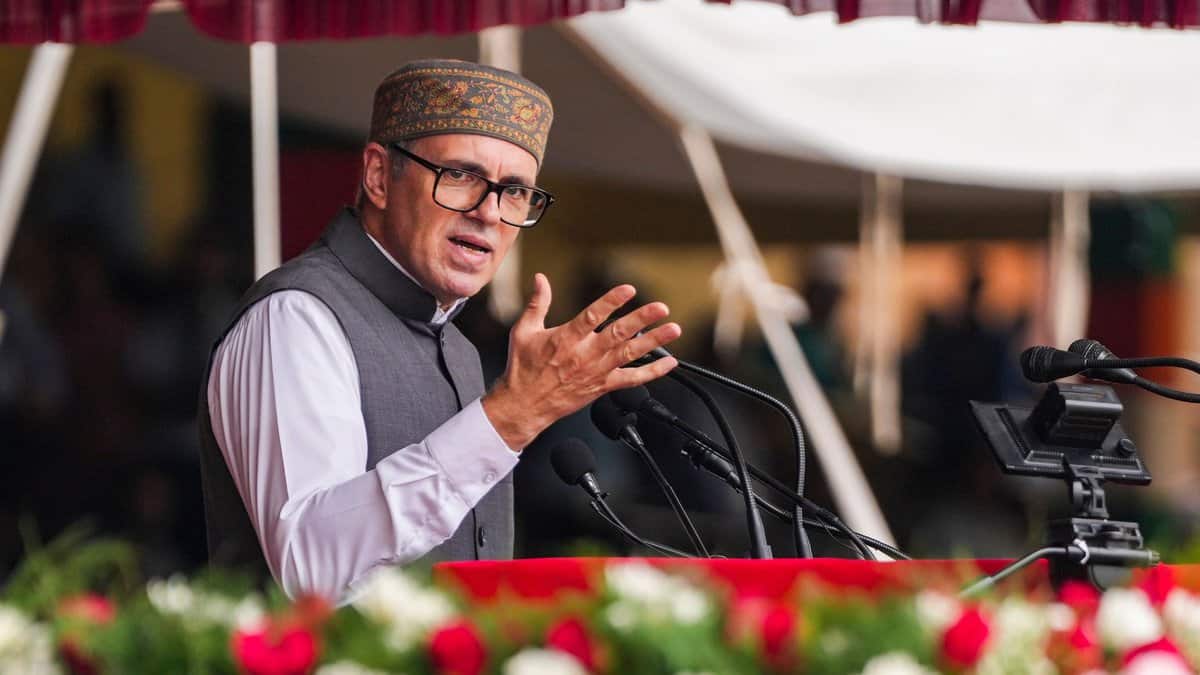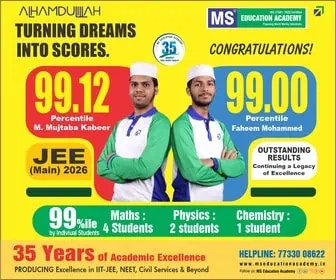
Srinagar: Chief Minister Omar Abdullah on Friday delivered a forceful Independence Day speech, criticising the practice of linking terror attacks to Jammu and Kashmir‘s political future and asserting that Pakistan should not be allowed to influence it through terrorism.
In his first speech since Jammu and Kashmir was downgraded to a union territory, he announced a signature campaign would be launched to press the demand for restoration of statehood.
Abdullah’s remarks came a day after a Supreme Court bench, led by Chief Justice of India B R Gavai, said “incidents like Pahalgam” must be considered when deciding on statehood.
Pakistani terrorists killed 26 civilians, mostly tourists, in the Baisaran meadow in south Kashmir’s Pahalgam on April 22.
In his speech at Bakshi Stadium here, Abdullah termed the reference to Pahalgam “unfortunate” and directly challenged the idea of letting terror dictate the region’s political future.
He said, “Will the killers of Pahalgam and their masters in the neighbouring country decide whether we will be a state?”
“Every time we are close to statehood, they will do something to sabotage it. Is this fair? Why are we being punished for a crime in which we had no role?” the chief minister questioned, pointing that residents from Kathua to Kupwara protested the Pahalgam attack on their own will.
J&K govts brought down militancy, claims CM
Abdullah asserted that successive governments in Jammu and Kashmir progressively brought down militancy.
“Elected government, whether mine or of others, did not allow such incidents. We had brought down the militancy-related parameters every year. Today it is said that we cannot handle the situation. We have not failed earlier and we will not fail in future as well. You will have to trust us,” he said.
To fight the recent legal and political setbacks, the chief minister announced a plan to take the people’s voice directly to Delhi. “The Supreme Court has given us eight weeks,” he said, referring to the time granted by the apex court before the next hearing on the statehood issue.
“Me and my colleagues will use these eight weeks to go to each of the 90 assembly constituencies of Jammu and Kashmir.”
As part of this door-to-door campaign, he said, people will be asked for their signatures or thumb impressions to answer a single question — “Do you want to make Jammu and Kashmir a state again or not?”
He promised to obtain signatures from lakhs of people and submit them before the central government and the Supreme Court as a clear public mandate.
An emotional Abdullah, while admitting that he his political image has suffered due to dual power centres in Jammu and Kashmir, confessed that after much contemplation, he decided to speak from his heart in his inaugural Independence Day address instead of reading a scripted government speech.
“If I had read that, the people of Jammu and Kashmir would have thought that all is well. There is no question of change,” he said.
‘J&K statehood a fading hope’
The CM also spoke about the fading hope for a major announcement from New Delhi regarding Jammu and Kashmir’s future. He said his well-wishers told him that he could expect a significant change, but admitted that his hope had begun to dim.
“We waited impatiently for that speech,” he said, referring to Prime Minister Narendra Modi’s address to the nation on Independence Day.
“I was even told that the documents are being prepared… We waited. It did not happen. The truth is that the ray of light have started to fade,” he said.
However, Abdullah insisted that he is not “helpless” and refused to accept the status quo.
In his speech, Abdullah reflected on the changes that have occurred over the last 11 years, since he last addressed the public from the same venue.
“When I was standing here 11 years ago, I was the chief minister of J&K state. In this country, we had our own identity, our own special status, our own flag, our own constitution. Today, none of that is left.”
Difference leading a state and UT, says Omar
Reflecting on his previous tenure from 2009 to 2014, Abdullah highlighted the significant differences between leading a state and a union territory.
“I am the only person in the whole world who can really tell the difference,” he said and described the current governance model as a system “not for success” but “for failure”.
The chief minister likened his government to a horse which has its front legs tied and is expected to gallop.
“It (the horse) may walk but it will not reach the destination as fast as expected,” he said, adding, “We have been given a government. There are powers in the government. But somewhere our hands are tied behind our backs.”
Taking on the bureaucracy, Abdullah said while the government is accountable to the assembly, and the assembly to the people, the bureaucracy is failing to answer to the elected government.
This breakdown disrupts the “triple chain of accountability” essential for a successful democratic government, he said.
Abdullah lamented that many of the cabinet’s decisions are being changed or stopped without its consent.
He questioned the point of having an elected government if it is not empowered to govern effectively. “What I regretfully say today is that we don’t have that power,” he said, emphasising that a “new Jammu and Kashmir” cannot be achieved without the full powers of statehood.
Despite the challenges, he said, he is not ready to accept the current situation and will not rest until justice is achieved. “We will get justice… and we will rest only after that by God’s will,” he said.


